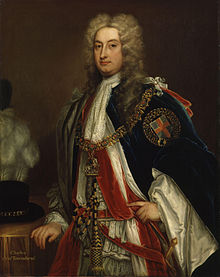Charles Townshend, 2nd Viscount Townshend
Charles Townshend, 2nd Viscount Townshend KG PC (born April 18, 1674 in Raynham Hall , Norfolk , † June 21, 1738 in Paris ) was a British politician of the Whig Party. He was Secretary of State and directed British foreign policy for a decade.
Life
Townshend was the eldest son of Horatio Townshend, 1st Baron Townshend , Viscount Townshend since 1682, from an old family in Norfolk . In 1687 he inherited the title from his father. He attended Eton College and King's College in Cambridge and then began a career as a Whig politician (initially with Tory sympathies) in the House of Lords . 1707 he became a member of the Privy Council , 1708 Captain of the Yeomen of the Guard and from 1709 to 1711 Ambassador to the Netherlands. In this role he was involved in the negotiations for the Peace of Utrecht . He supported the election of George I as king in Great Britain in 1714 and became Secretary of State for the Northern Department after his inauguration. There he was initially occupied with the suppression of the Jacobite uprising in 1715 and subsequently campaigned for the end of the Northern War , a peace policy and alliances with both France and the emperor.
Townshend was ousted from office in December 1716 through an intrigue by Charles Spencer, 3rd Earl of Sunderland , who also won Townshend's colleague James Stanhope on his side. Spencer had succeeded in convincing the king that Townshend and his brother-in-law Robert Walpole were up against the Prince of Wales , who was in conflict with the king and whom the king suspected of wanting to depose him. Townshend became governor in Ireland ( Lord Lieutenant of Ireland ), which he only stayed until April 1717. After the Whig factions of Townshend and Spencer approached again in 1720, Townshend became Lord President of the Council . In February 1721 he was after the death of James Stanhope and the forced resignation of Spencer in the wake of the financial crisis in the South Sea Bubble again Secretary of State in the Northern Department, while Walpole First Lord of the Treasury and Chancellor of the Exchequer (Chancellor of the Exchequer ) has been. Together they directed the business of government for the rest of the reign of George I. Even under George II, he initially remained in office (although he did not like him), but he lost more and more power to Walpole. In 1730 there was a final break between the two, and Townshend resigned on May 15. A main reason was his attitude towards Austria in foreign policy - an alliance with the Kaiser was a central concern of Walpole.
Influence on the British Agricultural Revolution
Townshend retired to his country estate in Raynham and devoted himself to farming. He was responsible for the widespread introduction of the white fodder beet in England and was therefore also nicknamed "Turnip Townshend" (Turnip was the English name of the beet), which was mostly meant ironically. Townshend experimented on a large scale in agriculture and introduced the four-field system (wheat, barley, beet and clover) in England, which had first been tried by farmers in the Waasland region in East Flanders in the 16th century. Before that, three-field farming (rye / winter wheat, oats / barley, resting phase) had been practiced. The change in cultivation reduced the susceptibility to disease, the elimination of fallow land in the third year increased productivity and more fodder was available for cattle breeding. Townshend's method emerged as a major innovation in the "agricultural revolution" of 18th century England. Together with Thomas William Coke, 1st Earl of Leicester and the rancher Robert Bakewell , he is counted among the fathers of this revolution.
family
Townshend was first married to Elizabeth, daughter of Thomas Pelham, 1st Baron Pelham of Laughton. She died in 1711. In 1726 he married Dorothy, the sister of Robert Walpole, in his second marriage. He had eight sons, some of whom became politicians:
- Charles Townshend, 3rd Viscount Townshend (1700–1764), his eldest son, from 1723 in the House of Lords.
- Thomas Townshend (1701–1780), from 1727 to 1774 for the University of Cambridge in the House of Commons . His son Thomas Townshend, 1st Viscount Sydney , (1733-1800) was Secretary of State (1782/3 and 1783-1799) and July 1782 to April 1783 leader of the House of Commons. The city of Sydney in Australia is named after him.
- His eldest son from his second marriage, George Townshend (1715–1769), was an admiral from 1765.
Web links
| predecessor | Office | successor |
|---|---|---|
| Horatio Townshend |
Viscount Townshend 1687-1738 |
Charles Townshend |
| William Cadogan | British ambassador to the Netherlands 1709–1711 |
Thomas Wentworth |
| Charles Spencer |
Lord Lieutenant of Ireland 1717 |
Charles Paulet |
| Evelyn Pierrepont |
Lord President of the Council 1720-1721 |
Henry Boyle |
| personal data | |
|---|---|
| SURNAME | Townshend, Charles, 2nd Viscount Townshend |
| ALTERNATIVE NAMES | Townshend, Charles |
| BRIEF DESCRIPTION | British Whig Party politician |
| DATE OF BIRTH | April 18, 1674 |
| PLACE OF BIRTH | Raynham Hall , Norfolk |
| DATE OF DEATH | June 21, 1738 |
| Place of death | Paris |
